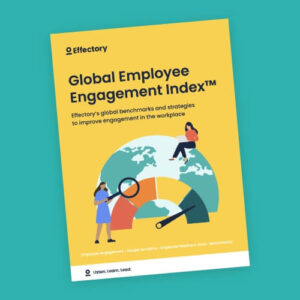The board of Directors (including CEOs) account for a ninefold difference in employee engagement and commitment. Insights gained from employee survey analysis reveal that when employees have confidence in the board, they are nine times more likely to be engaged in their work and committed to the organisation.
The role of senior management in employee engagement

From the beginning of 2015, Effectory have been studying employee engagement and commitment in European multinationals. The aim of our study was to comprehend the key factors and drivers of the two, and gain a deeper understanding of the current challenges and successes that multinationals are facing and the manager’s role in employee engagement.
Our research is based on the employee surveys that we conducted with the multinationals in the last 18 months. The end report contains detailed industry analysis and further, we discuss the challenges and successes in multinationals today, including: Efficiency, Immediate managers, Senior management, Well-being.
Global Employee Engagement Index™
Discover the Global Employee Engagement Index™ 2025 for key insights on driving employee engagement, improving performance, and enhancing team dynamics.
DownloadManager’s role in employee engagement
A committed senior management and board is not just essential for the daily running of a business, the formulation of achievable goals and a good strategy, but it is also necessary for high engagement, functional teams, commitment and trust. The foundations of a successful company start at the top.
The multinational study found that when employees have confidence in senior management and the board, they are nine times more likely to be engaged and committed. Alongside this, when employees trust their manager’s, they also trust that they will be treated fairly and with respect. The consequence of such trust is that employees are able to put their energy into their work (instead of into mistrusting the organisation) and mutual trust and respect between employer and employee grows.
CEOs and employee engagement: why the two need each other
Manager’s guide to employee engagement
As discussed, when employees have confidence in senior management and board they are nine times more likely to be engaged and committed. Clearly, senior managers have an enormous role to play in employees’ engagement and commitment. The question so often posed to us is: what makes exceptional senior managers?
Our study uncovered that the senior managers at the forefront of excellence share three traits:
1. Listening to employees
One advantage for senior managers listening to employees is that they know what is going on inside the organisation and on the shop floor. Listening to employees keeps them connected. An additional benefit is that employees also feel more appreciated if they know managers listen to them and take them seriously.
An essential component to enabling a two-way channel between senior managers and employees is ample opportunity to provide tips and suggestions. The offshoot of providing feedback opportunities is the creation of a win-win situation: engagement and commitment increases, and organisations receive new and innovative ideas.
Why CEOs would be wise to listen to employees
Best practices: Creating an environment where employees are heard
- Allow employees the chance to partake in a voluntary brainstorm about an organisation-wide issue. The best results come when a well-defined issue is selected and the session is overseen by someone who is able to offer assistance.
- As senior management, consider organising a monthly initiative with employees to exchange thoughts about organisation-wide subjects.
- Use the new possibilities offered by social intranet to enable employees to share and discuss their ideas.
manager’s role in employee engageme
Engaging employees in multinationals
Download the free HR report on employee engagement and commitment in multinationals
Download2. Connecting with employees
The added benefit of senior management staying connected with employees is that trust, effort, engagement and commitment increases. Far too often however, we see multinationals adopting an Ivory Tower management style. Senior management spends little to no time at the lower levels of the organisation, and invests minimal effort in connecting with employees. Decisions are made with sole input from the top level, whilst the lower levels feel the effect of such decisions.
When witnessing such behaviour we ask one critical question: How can you make good business decisions if, at the bottom level, you have little connection with your employees and don’t know what’s going on?
The top 4 drivers of employee engagement and commitment
Best practices: Keeping up to date with what’s going on
- Invest time in going through the results of your employee survey (both the numerical results and the comments). The important part is paying close attention to what employees are saying and showing that you take their input seriously.
- Mix with employees as much as possible through work visits, shadowing, or working alongside them.
- Consider organising social initiatives where employees are free to discuss their work, successes, and concerns with senior management. Successful examples that we have seen include: a monthly lunch with the CEO and senior management, as well as small scale seasonal events.
3. Clear organisational vision and goals
Clarity about intended goals helps employees make better day-to-day decisions at work. Employees know what the collective objective is and they can therefore adapt their contribution to it accordingly. The additional advantage is that efficiency between employees is improved, and less time and resources are needed on issues that do not have any bearing on the aspirations of multinationals.
Best practices: Creating clear vision/objectives
- Try to keep the vision and goals as simple as possible, however large the organisation may be. If it can’t fit easily into one or two sentences, the chances are that confusions within the company will arise.
- Involve employees in the formulation of the organisational goals. Doing so enables organisations to enjoy more clarity and support from employees. Additionally, it enhances employees’ intrinsic motivation to contribute.
- Communicate regularly about progress and whether or not the organisational goals are being reached.
Employee Engagement
Increase employee engagement through action-oriented feedback. Using a single platform, you can collect reliable data, analyze the results, and share insights.
view employee survey solution
